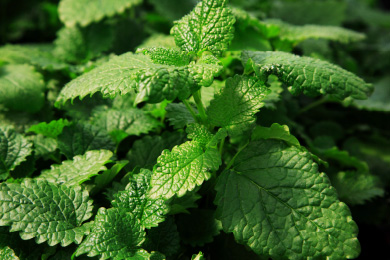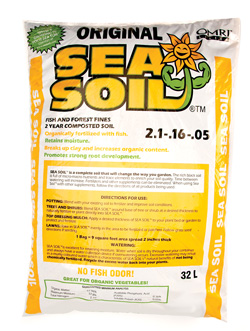Growing Herbs
Herbs can be purchased in seedling form in spring from the greenhouse or in seed form most times during the year. Herb kits are also available for growing herbs indoors during winter. Ask a greengate expert if you are new to herbs, as they can be tricky, but also very rewarding.


Herbs Gardener Secret:
Pot herbs in Sea Soil. Slower growing herbs have more flavour.
Outdoor herbs will be healthier. Try not to grow herbs inside due to dry air conditions.
Basil should not be put outside until all threat of frost has passed due to
it's extremely delicate nature.
Growing herbs indoors:
If you have a room that gets consistent direct, natural sunlight, you could actually grow your own edible herbs indoors and spring is a great time to sprout the seedlings.Herbs like basil, mint, and parsley will thrive indoors.
Give plants Evolve Rage Plus 0-0-6 in early spring. Trees and shrubs can benefit from a quick dose of this fertilizer while they are budding out. It takes about a month before you will see results, so April is a great time to give them a shot to get them going.

Try Earth Alive in your seedling trays, pots or in your garden.
Earth Alive is a beneficial fungus that breaks down organic materials into the nutrients that your plants need. Just mix into the soil at the time of planting. This product is super beneficial especially if you use organic materials like compost for fertilization, as it speed-up the delivery of nutrients to the plant roots through colonization.

Use Myke!
Myke is also a beneficial fungus that is applied directly to the roots of your plants.Myke offers a 75% better survival rate for your plants by increasing the root system. Whether it's trees, shrubs, annuals or perennials it doesn't matter! If you are planting use Myke for amazing results. Myke comes in several containers as they have different microbes in each, so buy specifically for the plants you will be planting. If you're not sure Myke tree and Shrub has all the MYCORRHIZAE necessary for any plant.
Did you know that if you purchase Myke with your trees and Shrubs we offer a 5-year warranty?

FAST TIP 1
Flowers are not welcome.
Flowers are pretty and lovely to see on our annuals or perennials, on herbs, they're normally a sign of nothing good. Unless your growing something for its edible flowers, prune before they start growing flowers. Plants like sweet basil turns bitter because flowers ruin the flavour.
FAST TIP 2
Keep it manageable.
If you're new to gardening, or space is limited, consider choosing two or three herbs to begin with. Begin with those you think you will use more.
FAST TIP 3
When planting herbs choose a sunny spot that will not be out of site, and therefore out of mind. If you can keep an eye on them, you can keep them happy, plus you will be more apt to use them.
FAST TIP 4
Go easy on the fertilizer when growing herbs.
If too much fertilizer is used, plants will produce large amounts of foliage with low quality flavor.
Herbs and their Culinary Uses:
- Bouquet
- Condiment
- Flavouring
- Fragrance
- Potpourri
- Sachet
- Salad Garnish
- Seasoning
While we endeavor to keep all of the following herbs in stock, we may experience occasional shortages between deliveries.
Anise - licorice-flavored, cookies & cakes, teas, curries
Basil - fish, chicken, seafood, pesto, pasta, salads, soups, sauces
Varieties:
- Lemon
- Lime
- Purple
- Spicy Globe
- Sweet
- Thai
Borage (self-seeds) - cucumber-flavored, salads, drinks
Chives - mild onion/garlic flavor, vegetables, stews, soups
Varieties:
- Common (perennial)
- Garlic (perennial)
Chamomile - aids in digestion, tea, cream sauces
Varieties:
- German (mild)
- Roman (perennial)
Chervil (self seeds) - salads, fish, soups, stews, vegetables
Cilantro (leaves) - salads, chutney, salsa, soups, sauces
Coriander (seeds) - curries, pickles, beer
Dill - pickles, soups, sauces, dips, vegetables
Fennel - fish, salads, soups, egg dishes, use bulbs like celery
Lovage (perennial) - celery-flavored, soups, stews, vegetables
English Lavender - herbal jellies, vinegars, and oils
Lemon Balm (perennial) - tea, fish, potpourri, insect deterrent
Lemon Verbena - desserts, sauces, fish, rice, ice cream
Marjoram (perennial) - meat, eggs, vegetables, salads, vinegars
Mint - tea, baking & candy making, sauces, drinks, potpourri
Varieties:
- Banana (perennial)
- Chocolate (perennial)
- Ginger (perennial)
- Mojito
- Orange (perennial)
- Peppermint (perennial)
- Pineapple
- Spearmint (perennial)
Oregano - soups, sauces, pasta, vegetables
Varieties:
- Greek
- Golden (mild
Parsley - vegetables, meat, salads, sauces
Varieties:
- Curled (biennial)
- Italian (biennial)
Rosemary - chicken, lamb, pork, beef, vegetables
Varieties:
- Arp (fragrant, upright)
- Barbeque (long upright stems)
- Foxtail (semi-trailing)
- Irene (bright blue flowers)
- Madalene Hill/Hill Hardy (fragrant, upright)
- Roman Beauty (dense foliage, semi-trailing)
- Salem (fast-growing, upright)
- Tuscan Blue (fragrant, columnar)
Sage - poultry, pork, salads, stuffing, sauces
Varieties:
- Garden/Common (perennial)
- Berggarten (gray-green foliage)
- Pineapple (jams & jellies, drinks, salads)
- Purple (colorful & tasty)
- Tangerine (bright red flowers, orange-scented)
- Tricolor (great for the kitchen or in containers)
- Sorrel - salads, soups, sauces
Stevia - a very sweet sugar substitute
Savory - egg dishes, vegetables, soups, meats, salads
Varieties:
- Summer (mild)
- Winter (perennial)
- Tarragon - sauces, salads, fish, poultry, vinegars
Thyme - poultry, fish, salads, vegetables
Varieties:
- English (perennial, the most common)
- Lemon (glossy green lemon-scented leaves)
- Silver (variegated leaves, great with roasted vegetables)
